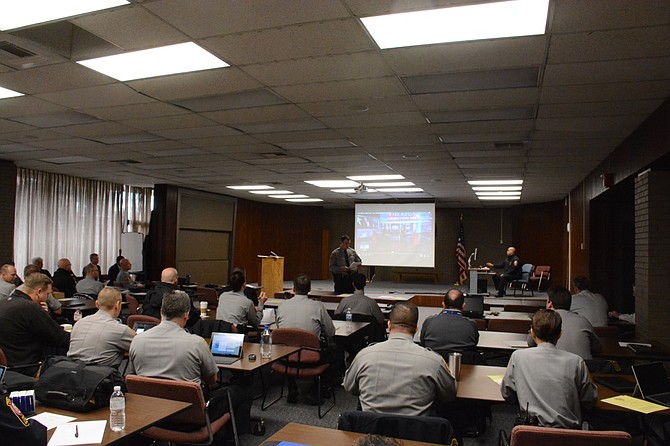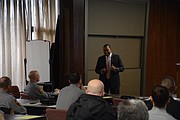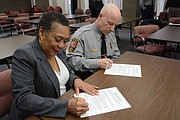Fairfax County police commanders receive diversity training as part of a monthly meeting normally off-limits to the public and media. On this occasion, however, Chief of Police Edwin Roessler wanted to include eyes from the outside as he continues to “re-engineer” the force in terms of community engagement, transparency and accountability. Photo by Tim Peterson.
West Springfield District Police Commander Cpt. Gervais T. Reed said when police officers leave the profession, some are in good shape, others are bitter. In the course of carrying out their duty to protect and serve citizens, officers can be cursed at, assaulted and have projectiles hurled at them, he said.
That kind of backlash can wear a person down and stress them out, even make them feel victimized, Reed said. “But we have to forgive,” he continued, “not take those things personally, to the extent that we can. We’ve got to be professional.”
Heightened professionalism and forgiveness in law enforcement were part of the message delivered by Eric Broyles to a room full of Fairfax County police commanders, leaders from the Sheriff’s Office and several other civilian leaders on Feb. 2.
Broyles is a Washington, D.C.-based attorney and co-author of the book “Encounters with Police: A Black Man’s Guide to Survival.” He said he wrote the book for a group of young men he was mentoring, preaching the concept of “comply now, contest later” in the event of a traffic stop or other interaction with police.
But speaking to the other side of that interaction, Broyles said he wanted to remind officers they “have a higher burden” when it comes to meeting with citizens. “They’re the professionals,” he said. “They have to raise the standard. It’s socially unacceptable to have officers operate with racial innuendo.”
Reed said he had already read Broyles’ book, and that him coming to address the police commanders was a noble task. The author’s statements about professionalism and forgiveness, Reed said, made the most impact, and are things he intends to take back to his station and share with his first line supervisor and other officers.
The commanders were receiving diversity training as part of a monthly meeting normally off-limits to the public and media.
On this occasion, however, Chief of Police Edwin Roessler wanted to include eyes from the outside as he continues to “re-engineer” the force in terms of communication, transparency and accountability.
Roessler said diversity training is required by the Commonwealth of Virginia to be administered every two years, but at the bare minimum that involves a mere computer course.
“We have to change the culture of policing,” Roessler said, “this is about ethical leadership through engaging with the community.”
To go above the requirement the day’s training included three speakers, of which Broyles was third.
First was Geneviève Fine, board member of the Fairfax County Domestic Violence Prevention Policy and Coordinating Council. Though members of the media weren’t able to see any of her presentation, Fine said afterward that she spoke to the commanders about Lesbian, Gay, Bisexual and Transgender issues, educating them about terminology, how to best approach a situation involving someone from the LGBT community and ideas for avoiding escalating a potentially violent situation.
Fine said there is some fear among LGBT individuals, especially in young people, of being outed to their parents through an interaction with police.
“You have to be careful how you take care of that case,” Fine said.
During a question-and-answer period, Fine said officers asked her about the always controversial issue of transgender people using bathrooms of the sex with which they identify.
“If they’re called to a bathroom,” Fine said, “it’s likely there’s something else going on,” and not transgender people causing the problem. Most just want to get in and get out as quickly as possible, she said.
Second to speak was Shirley Ginwright, who until January was president of the Fairfax County NAACP. She addressed the commanders, however, as chairman of the Fairfax County Communities of Trust Committee. Board of Supervisors Chairman Sharon Bulova created the committee in 2015 “to advance collaboration, partnerships and outreach between public safety agencies and the communities they serve,” according to the county’s website.
Ginwright emphasized that in Fairfax County, police and communities are building on existing trust, not starting from square one.
But she also wanted to remind the commanders what the Communities of Trust can offer, what they’re doing and what they’re planning on doing.
“We have a lot of volunteers,” Ginwright said, “and resources they haven’t tapped into.”
Ginwright took time with Roessler following the presentations to sign a memorandum of understanding between the Communities of Trust and Fairfax County Police Department, formalizing the role her organization would play in preventing a social crisis like the one in Ferguson, Mo. following the shooting of Michael Brown in 2014.
Ginwright said the chief of police would contact the communities of trust committee in case of such an event, who would then communicate immediately with an array of community leaders to help organize citizens and maintain peace and order.
Roessler said this type of action is already part of his personal crisis protocol, but the memorandum established a standard to which future chiefs and committee chairs shall commit as well.



